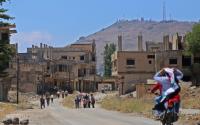20 June 2004The Observer
Britain and America launched a desperate effort yesterday to prevent more than 30,000 of their citizens fleeing Saudi Arabia in fear after the execution last week of an American technician by an Islamic militant group. An exodus of foreign workers, who are critical to the country's economy, could prompt the collapse of the regime in the crucial, oil-rich ally.
A series of targeted attacks in the last three weeks, culminating in the beheading of 49-year-old Paul Johnson on Friday, has convinced many Westerners working in Saudi Arabia they should leave. The reported death of Abdulaziz al-Muqrin - leader of al-Qaeda-type groups in the kingdom and the man who killed Johnson - at the hands of Saudi security forces on Friday evening has not reassured nervous expatriates.
Johnson worked on Apache attack helicopter systems for Lockheed Martin and was held captive for six days before being killed.
Steve, a business consultant from California who wanted to remain anonymous, said the recent violence had led him to accelerate plans to relocate elsewhere in the region. The 53-year-old said he thought Muqrin's death would only inspire other young Saudis to join the militants.
'I need to get into a stable environment for my family, and I think the time has come to move,' he said.
US Secretary of State Colin Powell said terrorists would earn a victory if American workers leave Saudi Arabia.
'If they leave, then the terrorists have won,' Powell said. 'I don't think either the Saudis, the Americans, or these brave folks who work in Saudi Arabia want the terrorists to win.'
The Foreign Office is advising Britons against all non-essential travel to Saudi Arabia but has stopped short of telling those in the kingdom to leave - though the departure of non-essential diplomatic staff and dependents has been authorised. The FO is warning all Westerners in Saudi Arabia to take rigorous security precautions and says it fears future attacks. A BBC camera crew was attacked and a cameraman killed two weeks ago.
The US State Department has issued a public warning that 'extremists may be planning attacks against Westerners and oil workers in the Persian Gulf region', adding that there is a continuing possibility of terrorist attacks directed against Americans in the Red Sea area, the Persian Gulf, Arabian Peninsula and North Africa.
Saudi authorities claimed they had killed Muqrin along with three other prominent militants, hours after the group carried out its threat to behead Johnson.
State television broadcast pictures of four bloodied corpses. Twelve other militants were arrested, including one believed to have been involved in the 2000 bombing of the warship USS Cole off the coast of neighbouring Yemen.
'This is a massive blow to the militants,' a source close to Saudi security officials said. 'A huge number of the group around Muqrin were taken out last night - killed or arrested.'
Security forces caught up with Muqrin as his cell tried to dispose of Johnson's body. The group had posted photographs of the aviation engineer's severed head on a website.
The televised pictures of the four dead militants appeared to be aimed at refuting a purported al-Qaeda statement posted on an Islamist website which denied Muqrin was dead. One of the men had escaped after an attack on foreigners in the Gulf city of Khobar in May and another had been involved in preparation of the bombing of an expatriate residential compound in Riyadh in November, it said. It is thought the four men were tracked down to a petrol station in the Malazz district of central Riyadh, following a tip-off from a local.
Analysts say that whatever actions are taken by security services, fundamental reforms are necessary in the autocratic kingdom to beat the threat of Islamic militancy. Though the Saudi Arabian regime is now cracking down on the radicals, little is being done to tackle the hardline conservative Islamic ideology that has been taught to millions in the kingdom's schools for generations and is, in part, responsible for the current wave of extremism, they stress.






